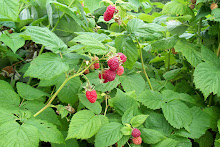My little Dendrodrilus Ribidus are doing very well. The bin seems happy and full of life. I am seeing a lot of worm cocoons and little tiny worms so I'm guessing all is well now. I did have a bit of an issue a little while ago when I change the bedding. I used brown leaves that I soaked in water then drained for their bedding. I obviously didn't check the leaves well enough and I discovered a couple of centipedes in the bin a few days later. Centipedes are a no-no; they eat baby worms and generally cause havoc and mayhem. I've got enough havoc and mayhem in my regular life, I don't need it in my worm bin. Anyhow, everything seems to be back to rights now.
I did discover those little yellow and orange eggs I mentioned in my last worm entry were indeed worm cocoons. I took a few of of the eggs and put them in a small container with damp leaves. In a few days, the container was teeming with brand new worms! Ah, science at a basic level - "Let's try it and see what happens".
When I did change the bedding, I ended up with worm castings. Worm castings is beautiful, black, earthy smelling stuff. It is absolutely gorgeous to look at, considering worm castings is basically worm poop. I bagged the castings but left the top open for a couple of days. Sure enough, I had missed a few cocoons and found a bunch of baby worms. So they are now in the bin and I have some great stuff to plant in next spring. I think I will use it right around the seeds and plants.
Changing the bin's bedding and collecting the castings is a major operation. First I have to get Don and P, teenage son, to haul the heavy bin outside. Then on a plastic sheet that is in full sun, I remove all the contents, trying to make a mini-mountain shape. The worms don't like the sun and burrow deep down. So then I start removing the castings until I hit the worms again, I'll wait a few minutes while they wiggle furiously further down to escape from the light. I remove some more of the castings and repeat the process, and repeat and repeat and repeat until all I have left is a rather large and extremely annoyed squirm of worms. I put them in the nice, fresh bin and get the boys to haul the bin back down into the nice cool wood room. I was surprised at how long it took, almost two hours, which is why I see it as a major operation. But it was worth it, the castings are very impressive.
I did try something new that didn't seem to work at first. Usually I give them pretty 'aged', shall we say, bunny manure for food. Well, that's almost composted completely so last time I fed them, I used fresher stuff that I soaked in water for a while. I found it really heated up the bin and the worms didn't like that. They stayed away from manure. I just checked it this morning and while I found it was still giving off heat, I found the worms happily devouring it. I'm figuring the warming may not be a bad thing for the winter, that wood room gets awfully cold and a little heat might be welcomed. As long as I don't put too much in at one time. A bit of experimentation will be needed, I think. Simple science is calling again...
Sunday, September 14, 2008
Subscribe to:
Post Comments (Atom)

No comments:
Post a Comment